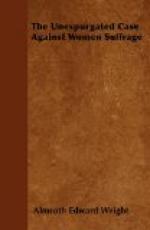It is not at all certain that the institution of matrimony—which, after all, is the great instrument in the levelling up of the financial situation of woman—can endure apart from some willing subordination on the part of the wife.
It will have been observed that there is in these programmes, in addition to the element of mental disorder and to the element of the fatuous, which have been animadverted upon, also a very ugly element of dishonesty. In reality the very kernel of the militant suffrage movement is the element of immorality.
There is here not only immorality in the ends which are in view, but also in the methods adopted for the attainment of those ends.
We may restrict ourselves to indicating wherein lies the immorality of the methods.
There is no one who does not discern that woman in her relations to physical force stands in quite a different position to man.
Out of that different relation there must of necessity shape itself a special code of ethics for woman. And to violate that code must be for woman immorality.
So far as I have seen, no one in this controversy has laid his finger upon the essential point in the relations of woman to physical violence.
It has been stated—and in the main quite truly stated—that woman in the mass cannot, like man, back up her vote by bringing physical force into play.
But the woman suffragist here counters by insisting that she as an individual may have more physical force than an individual man.
And it is quite certain—and it did not need suffragist raids and window-breaking riots to demonstrate it—that woman in the mass can bring a certain amount of physical force to bear.
The true inwardness of the relation in which woman stands to physical force lies not in the question of her having it at command, but in the fact that she cannot put it forth without placing herself within the jurisdiction of an ethical law.
The law against which she offends when she resorts to physical violence is not an ordinance of man; it is not written in the statutes of any State; it has not been enunciated by any human law-giver. It belongs to those unwritten, and unassailable, and irreversible commandments of religion, [Greek 1], which we suddenly and mysteriously become aware of when we see them violated.
[1 From Antigone by Sophocles; “the unwritten and unassailable statutes given to us by the gods.” Sir Almroth had it in the original Greek with Greek fonts.]
The law which the militant suffragist has violated is among the ordinances of that code which forbade us even to think of employing our native Indian troops against the Boers; which brands it as an ignominy when a man leaves his fellow in the lurch and saves his own life; and which makes it an outrage for a man to do violence to a woman.
To violate any ordinance of that code is more dishonourable than to transgress every statutory law.




